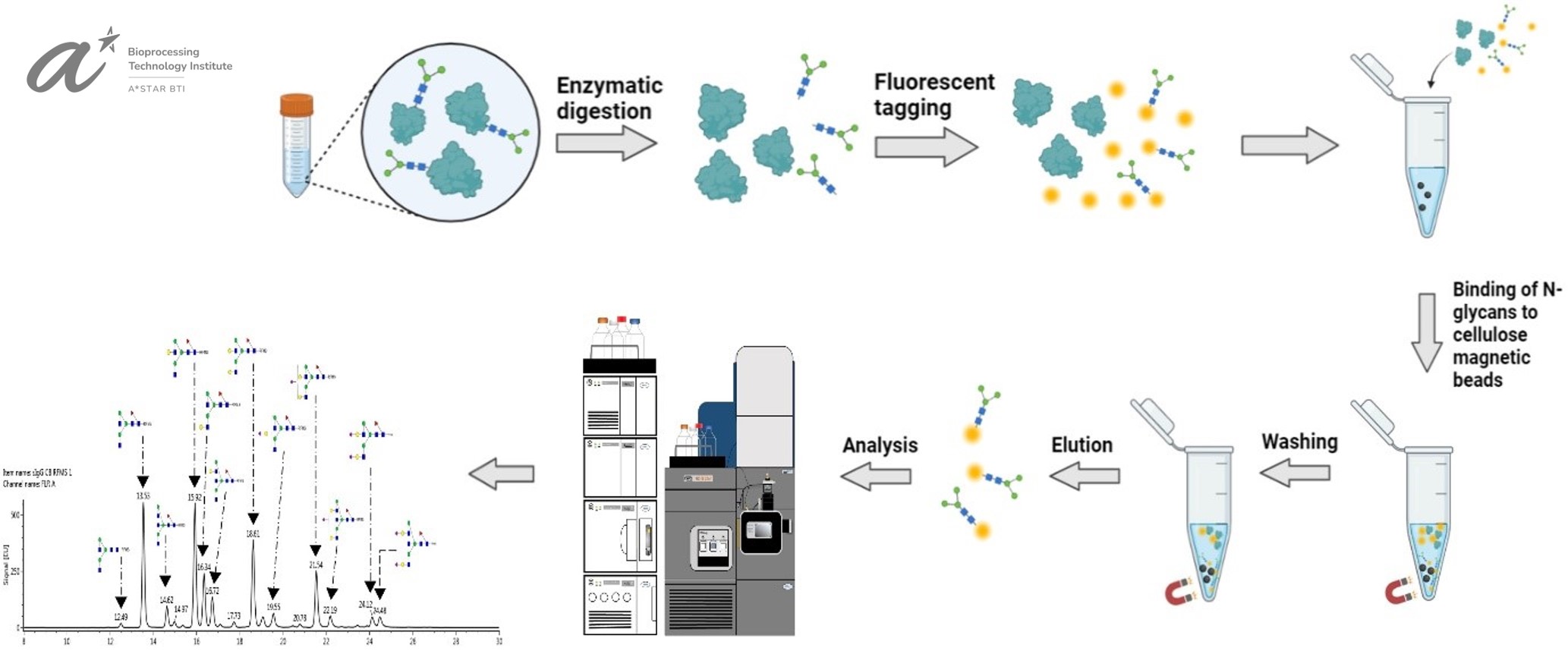Cellulose Functionalised Magnetic Beads for High-Throughput Glycosylation Analysis

Science
Glycosylation is the complex post translational process of adding sugar molecules, known as glycans, to lipids or proteins. It plays a key role in modulating several biological functions and is identified as one of the critical quality attributes required in the characterization of biotherapeutics as it can affect their safety, functionality and efficacy. However, current methods employed in glycosylation analysis are expensive and limited by throughput especially when there are numerous samples generated, as is the case in the biomanufacturing of therapeutics. Therefore, in this study the team aimed to address these concerns by developing a cost effective and automated high-throughput purification protocol employing cellulose functionalized magnetic beads.
Societal Impact
Commercially available cartridges or plates for glycans purification are either expensive, limited by sample volume and/or do not cater for high throughput analysis. We overcome these issues by using cellulose functionalized magnetic beads which are easily available and affordable to purify glycans. Our method offers the advantages of automated high throughput analysis across multiple sample types, of both sample volume and fluorescent label, allowing for flexibility in scaling up or down, while also greatly lowering the cost of analysis (by 9–20x) and improving reproducibility.
Technical Summary
In this study, we attempt to use magnetic beads that were functionalized with cellulose to purify glycans that were enzymatically released from glycoproteins. After release, glycans were labelled with a fluorophore and subsequently isolated and enriched using the cellulose magnetic beads. N-glycans identification and relative quantification were performed using LC-MS. Our results displayed similar if not, better performance in comparison with established methods with high reproducibility (average RSD < 4%). Furthermore, our approach was compatible with a variety of fluorescent labels (2-AB, procainamide and Rapifluor-MS), allowing us to cater to a wide range of experimental setups.
Notably, we were able to automate the purification process along with the glycans’ release and labelling onto the liquid handler platform, providing the possibility of integrating our cellulose magnetic beads workflow in high-throughput glycosylation analysis to support the fast turnaround in process optimization and lower the cost of characterization of biotherapeutic modalities. This approach will have potential applications also in other glycosylated related analysis such as glycopeptides, mucin-type glycans and human oligosaccharides (HMOs).

References
Corrine Wan, Shi Jie Tay, Beiying Qiu, Sean Chia and Ian Walsh (2024). Cellulose functionalized magnetic beads for high throughput glycosylation analysis in biotherapeutic modalities. Scientific Reports 14:29735
A*STAR celebrates International Women's Day

From groundbreaking discoveries to cutting-edge research, our researchers are empowering the next generation of female science, technology, engineering and mathematics (STEM) leaders.
Get inspired by our #WomeninSTEM
.png?sfvrsn=1a7df424_3)